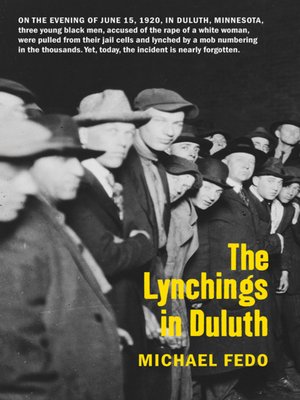
Sign up to save your library
With an OverDrive account, you can save your favorite libraries for at-a-glance information about availability. Find out more about OverDrive accounts.
Find this title in Libby, the library reading app by OverDrive.



Search for a digital library with this title
Title found at these libraries:
| Library Name | Distance |
|---|---|
| Loading... |
On the evening of June 15, 1920, in Duluth, Minnesota, three young black men, accused of the rape of a white woman, were pulled from their jail cells and lynched by a mob numbering in the thousands.
Up to a tenth of the city's residents clogged the street in front of the police station to witness the hanging. Reporters from the two major newspapers of Minneapolis and St. Paul shocked their readers with lurid accounts of the event. Leading newspapers throughout the North vilified Duluthians for having stained their city's good name and castigated them for being no better than southern racists. The governor of Minnesota, J. A. A. Burnquist, then president of the St. Paul chapter of the NAACP, commissioned his adjutant general to launch a formal investigation. Three dozen men were indicted for taking part in the mob action. And one year later, in reaction to the event, the state legislature enacted an anti-lynching law. Yet, today, the incident is nearly forgotten.
During the late nineteenth and early twentieth centuries, the lynching of blacks was typically a rural, southern phenomenon. This account of the lynchings that took place in Duluth shows that the mentality necessary for such events was not particular to any region.
Praise for The Lynchings in Duluth:"A chilling reconstruction of a 1920 racial tragedy. . . . Combining hour-by-hour, day-by-day narrative with expert scholarship based on interviews, suppressed documents and news reports, Fedo skillfully portrays Northern prejudice and violence. Without preaching or condemning, he makes readers firsthand witnesses to fear and injustice."-Los Angeles Times
"This tense book punches out a story of devastating fury. . . . Fedo has put his sharpest reportorial skills to work in resurrecting a little known racial atrocity. . . . As pointed as a Klansman's cap, this book conveys the horror of mob action-and the disturbing truth that it knows no region."-Milwaukee Journal
"The story of the events leading up to the lynching and the various stages in the action of the mob are vividly related in this superb work. Fedo presents in masterful prose-based on excellent research-a difinitive account of the Duluth lynchings. His graphic description of the mob and the context in which it operated provides evidence of the manner in which given the proper set of circumstances mass violence can occur anywhere and anytime."-The Ann Arbor News







